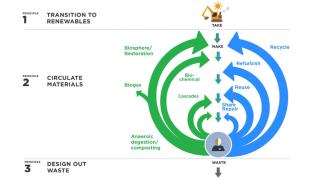Corporate Accountability
Corporate accountability in confronting climate change is now more crucial than ever. With extensive operations and expansive product portfolios, major corporations are at the forefront of environmental scrutiny. The Carbon Majors report reveals that just 100 companies are responsible for 71% of global emissions since human-driven climate change has been on the radar of the scientific community. This data presents an undeniable call to action for these corporate giants.
Historically, the role of these entities in carbon emissions has been somewhat shrouded in ambiguity, often due to the complex nature of global supply chains and operational intricacies. However, with advancements in research methodologies and greater transparency, the significant environmental toll of corporate activities is becoming clearer. The energy sector, laden with multinational corporations, stands out as a pivotal contributor to global emissions. The extraction, processing, and burning of fossil fuels remain cardinal culprits behind the surge in greenhouse gases.
Current efforts by some companies to mitigate their environmental impact often include sustainability goals, investments in renewable energy, and partnerships aimed at carbon offsetting. However, critics argue that such measures, albeit steps in the right direction, sometimes fall short of what is truly necessary to combat climate change effectively. The disparities between corporate pledges and actual decarbonization efforts raise questions about greenwashing and the sincerity of corporate commitments to ecological sustainability.
The debate surrounding corporate versus consumer responsibility for climate change is nuanced. Companies supply products and services that customers demand, but the manner in which these products are manufactured, packaged, and transported has long-lasting consequences on our planet. This interdependent relationship underscores the importance of collective action. Corporations can redesign their operational models to be more eco-friendly, just as consumers can shift towards more sustainable lifestyles. Yet, it's the large-scale industrial practices that undeniably have far-reaching impacts on our environmental health.
The legal and moral obligations of corporations to actively reduce their carbon footprint and address climate change are becoming more evident. Cases where communities impacted by climate change-related natural disasters are suing large fossil fuel companies hint at an emerging trend where corporate environmental negligence could have tangible judicial repercussions. This form of accountability pushes for immediate environmental stewardship and encourages a broader reevaluation of corporate philosophies toward sustainable development.
Achieving significant progress in halting climate change requires palpable shifts in how corporations operate and influence global policy. While consumer action plays a role, the overwhelming majority of emissions traced back to major corporations elucidates where meaningful change needs to commence. Corporations wield immense power, both politically and economically; leveraging this power for proactive environmental reform is imperative for our collective future.
Individual Actions
While the shadow of corporate responsibility looms large over the discourse on climate action, the role of individual actions beckons for attention and analysis. The traditional narrative propels advice towards individuals eager to make a difference—shifts in diet away from meat consumption, mindfulness about energy usage, and a reconsideration of how one travels. These recommendations, deeply personal in their implementation, offer a blueprint for reducing one's carbon footprint.
However, as we delve deeper, we confront a persistent question: When juxtaposed with the scale of emissions attributable to the corporate world, can these individual actions truly tip the scales toward a healthier planet? This isn't to undermine the value of choosing a plant-based meal or opting for a bicycle over a car but to place these choices within the broader tapestry of climate action.
Dietary changes possess potential for reducing environmental impact. The livestock sector alone accounts for 14.5% of anthropogenic greenhouse gas emissions globally, illustrating the impact that reduced meat consumption could have on global emissions. Yet, this change requires not only individual resolve but also systemic support in the form of accessible, affordable plant-based alternatives and widespread educational efforts about the environmental benefits of such a shift.
Similarly, when contemplating energy consumption, the decision to invest in more energy-efficient appliances and retrofitting homes with better insulation offers promise. Yet, individual endeavors hit a ceiling if not complemented by policies promoting renewable energy sources over fossil energy reliant grids. Here lies the crux—individual shifts in consumption habits face an uphill battle without systemic transformation offered by corporations and governments that hold the reins of energy infrastructure.
Transportation habits present another arena where the dichotomy between corporate influence and individual action reveals itself. Electing public transportation, biking, or walking over personal vehicle use reduces one's carbon footprint. However, ensuring sustainable transportation options requires more than personal choices—it demands significant investment from both corporations and governments in public transportation infrastructure, urban planning focused on walkability, and incentives for electric vehicle adoption.
These action points bring us to ponder the psychological and social dimensions of environmental behavior. Behavioral change is no easy feat, wrapped in societal norms, economic considerations, and often a sense of isolation in eco-conscious pursuits. The visualization of making a discernible impact can be murky for individuals when the newsfeeds are awash with stories of large-scale industrial pollution.
Social factors, such as communal norms and peer dynamics, heavily influence environmental behavior. Encouraging communities that prioritize sustainability initiatives can amplify individual actions. Peer pressure, often seen as a negative force, can be harnessed positively to encourage eco-friendly habits.
In contemplating the effectiveness and value of individual actions within the macrocosm of climate change efforts, a rounded perspective emerges. Although these actions may appear as mere droplets in the vast ocean of needed change, they carry intrinsic value—each decision a building block towards a cultural and behavioral shift that can steer systemic change. For while corporations must spearhead a transformational shift in operational substance and ethos towards environmental accountability, a collective momentum from individuals can help catalyze this shift, acting as both conscience and impetus for broader changes.
At the interface of individual actions and corporate activities, a comprehensive, synergistic approach toward climate action unfolds: one where personal decisions bolster social norms towards sustainability, emboldening policymakers and businesses alike to make bold, systemic shifts. Understanding this complex interplay of influences serves as a foundation for efficacious climate action—rooted in both collective and individual resolve.

Investor Influence
The financial sector holds a significant, yet often underutilized, key to unlocking substantial progress in the corporate world's response to climate change. Investors and shareholders, wielding the power to orient companies towards sustainable practices, are uniquely positioned to drive environmental accountability. Among the mechanisms at their disposal, divestment movements, shareholder resolutions, and ESG (Environmental, Social, and Governance) investing stand out as potent tools for change.
Divestment movements, which call for the withdrawal of investments from fossil fuel companies and other environmentally damaging corporations, have gained momentum worldwide. This strategy seeks to financially disincentivize business models that exacerbate climate change, pushing companies towards more sustainable operational frameworks. While critics argue about the direct financial impact of such divestments on giant corporations, the symbolic power of withdrawing support for ecologically destructive industries cannot be overstated. It sends a clear message: the era of reckless environmental disregard will no longer be profitable or acceptable.
Shareholder resolutions present another avenue through which investors can exact environmental stewardship from within. By proposing and voting on resolutions that align corporate policies with sustainable practices, shareholders leverage their insider status to enact change. Recent years have seen an uptick in the number of shareholder resolutions concerning climate change, advocating for everything from detailed reporting on greenhouse gas emissions to commitments for renewable energy procurement. The success of these resolutions hinges on persuading a substantial portion of shareholders that sustainability is not just an ethical imperative but a cornerstone of long-term profitability.
The growing trend of ESG investing exemplifies the financial sector's burgeoning commitment to sustainability. ESG criteria allow investors to screen potential investments, favoring companies that maintain high environmental, social, and governance standards. Beyond moral alignment, ESG investments often provide competitive returns, demonstrating that environmental responsibility and financial performance can go hand in hand. As ESG-rated funds and assets under management continue to rise, the signal to the market is clear: sustainability and profitability are increasingly interdependent.
Case studies abound of investor-led initiatives catalyzing significant corporate shifts towards sustainability. From the fossil fuel sector to consumer goods, shareholders are successfully pressuring companies to reassess their environmental impact and strategic direction. However, challenges persist in aligning investment strategies comprehensively with climate goals. The complexity of global supply chains, variations in regional environmental regulations, and the still-prevalent prioritization of short-term gains over long-term sustainability are formidable barriers.
Despite these challenges, the potential for transformative change through investor influence is immense. Activist investors and conscientious individuals alike are beginning to recognize that where they choose to allocate their capital can either propagate the status quo or pioneer a shift towards a sustainable future. As this wave of realization spreads across the financial sector, the hope is that it will not only tilt corporate behaviors towards environmental accountability but will also incorporate sustainability at the heart of investment logic.
In this intricate dance of individual actions, corporate practices, and financial decisions, each step forward in investor influence represents not just an advance in combating climate change but a reaffirmation of our collective commitment to the planet's future. Thus, the role of the investor, often seen through a purely financial lens, emerges as a pivotal force for environmental advocacy and action, blurring the lines between profit and planet in pursuit of a harmonious coexistence.

Policy and Legislation
One of the most pivotal battlegrounds in the quest for environmental sustainability lies within the corridors of legislative bodies worldwide. Policy and legislation have the potency to either catalyze or stymie efforts to hold corporations accountable for their climate impact. The effectiveness of such policies, however, is frequently mired in a web of political and economic considerations, raising questions about our collective ability to enact meaningful environmental change through governance.
Carbon pricing has emerged as a mechanism for addressing corporate emissions, centering on the principle that polluters should bear the cost of the environmental damage they cause. By assigning a price to carbon emissions, be it through carbon taxes or cap-and-trade systems, policy aims to incentivize reduction strategies by making pollution financially punitive. Therein lies its theoretical strength—providing an economic signal and a level playing field for carbon-intensive and low-carbon industries alike. In practice, however, the effectiveness of carbon pricing is frequently undermined by political reluctance to impose substantial costs on powerful industrial sectors and concerns about maintaining competitive pricing on the global market.
Similarly, subsidies for renewable energy have proven to be a valuable tool in catalyzing the transition to a more sustainable energy mix. By offsetting the initial high investment costs associated with renewable energy technologies, these subsidies aim to accelerate adoption and innovation in the sector. Yet, the landscape of renewable energy subsidies is often uneven, fraught with uncertainties around long-term commitments and skewed by entrenched interests in fossil fuel sectors that still receive substantial governmental support. This dichotomy hampers the growth potential of renewable energy and signals a lack of coherence in policy approaches towards achieving net-zero emissions targets.
Regulations aimed at reducing emissions from specific industries represent another facet of environmental policy seeking to address the direct sources of climate impact. Such measures range from stringent emissions standards for vehicles and industrial plants to policies mandating the integration of sustainability practices across operations. While these regulations can be highly effective on a micro scale, their scope and stringency vary greatly across regions and industries. The tug-of-war between environmental imperatives and industrial growth objectives often means that regulation is a compromise, diluted by exceptions, or phased in over extended timelines that lag behind the urgency of climate action.
Against this backdrop, the political and economic obstacles to implementing more stringent environmental policies are formidable. The influence of corporate lobbying cannot be understated, as companies with deep pockets and vested interests in maintaining the status quo exert considerable pressure on political processes. Additionally, concerns about economic competitiveness, job losses in carbon-intensive sectors, and public backlash against perceived increases in living costs pose significant challenges to the advancement of robust legislative frameworks for climate accountability.
Despite these hurdles, the pursuit of sustainable environmental policy is not an exercise in futility. Increasing public awareness and demands for climate action prompt a gradual shift in political will. Success stories, where comprehensive policies have led to significant emissions reductions and spurred innovation in green technologies, offer templates for what can be achieved with concerted effort and political courage.
Ultimately, the effectiveness of environmental policies and legislation in holding corporations accountable hinges on balancing economic and ecological interests—a delicate yet imperative task. As we march toward crucial climate thresholds, the role of policy in steering both corporate behavior and individual choices has never been more vital. In embracing this challenge, society must navigate the intricacies of governance, economics, and ecological stewardship, forging a path that reconciles prosperity with the planet's limits.

Future of Corporate Sustainability
As we look to the future of corporate sustainability, innovation will play a crucial role in reducing environmental impact. Advances in technology and changes in business models signal a new era where sustainable practices are not only possible but necessary for continued growth and competitiveness. Corporate sustainability is set to transform industries through the growing potential of renewable energy, circular economy practices, and improved supply chain management.
The use of renewable energy sources is at the forefront of this change. Solar, wind, and hydroelectric power technologies have become more efficient and cost-effective. Companies are starting to use these renewable sources to reduce their environmental footprint and secure long-term energy cost savings. Smart grids and energy storage solutions further enhance this potential, enabling a more resilient and sustainable energy infrastructure. However, the shift to 100% renewable energy requires not only technological innovation but also investment in new infrastructure and a commitment to phasing out reliance on fossil fuels.
The concept of a circular economy, which emphasizes the restoration and regeneration of products and materials, is gaining momentum. Unlike the traditional linear model of 'take-make-dispose,' the circular economy focuses on extending product life, reuse, and recycling. This approach significantly reduces waste and resource consumption. Adopting circular economy principles requires rethinking product design, material selection, and end-of-life management, creating opportunities for innovation and collaboration across sectors. The challenge lies in integrating these principles into core business strategies, shifting from viewing sustainability as a compliance issue to seeing it as a key driver of business value creation.
Sustainable supply chain management demonstrates the complex relationship between corporate actions and environmental stewardship. By incorporating environmental considerations into supply chain logistics, procurement, and product development, companies can reduce their ecological footprint while improving efficiency and brand reputation. Innovations in this area include:
- Using blockchain for enhanced transparency
- Adopting green logistics practices
- Engaging suppliers on sustainability performance
However, building sustainable supply chains is a complex process with challenges such as supplier compliance, cost implications, and navigating diverse regulatory landscapes. It requires collaboration among stakeholders across the value chain to foster a shared commitment to sustainable practices.
The journey towards sustainable corporate practices is influenced by global economic and political dynamics. Trade policies, international environmental agreements, and national legislation shape the operational environment for corporations. Political volatility and economic uncertainties can pose challenges to implementing comprehensive sustainability strategies. However, corporations that can navigate this complex geopolitical terrain, advocating for supportive policies and leveraging economic incentives for sustainability, will likely emerge as leaders in the new corporate landscape.

At the heart of our discussion on corporate sustainability lies a fundamental truth: the path to a sustainable future requires collective action and shared responsibility. The power of corporations to influence global policy and drive environmental reform is significant. However, it is the synergy between corporate initiatives, individual actions, investor influence, and supportive policies that will ultimately determine the pace and success of our environmental stewardship efforts. As we move forward, every decision and action, no matter how small, contributes to the larger goal of creating a resilient and thriving planet for future generations.
Create high-quality content with Writio, the top AI content writer. This article was authored by Writio.
